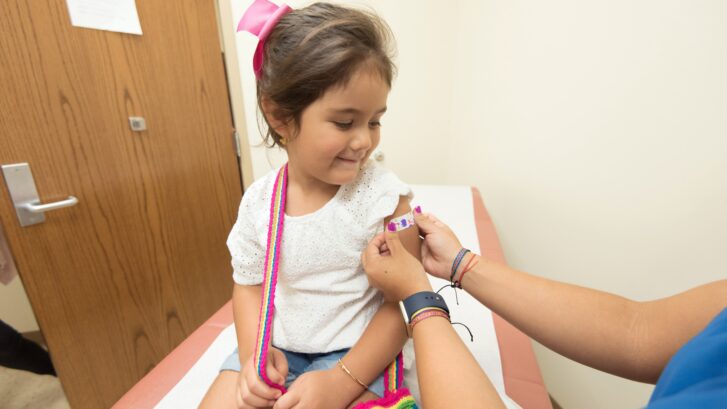MMR Vaccine May Protect Against COVID-19
With all the excitement and hope surrounding the rollout of the coronavirus vaccines, our concierge doctors want to highlight other vaccines that could also prove to be lifesavers. Particularly in the case of childhood vaccinations, we have seen a significant reduction in the numbers of children receiving routine immunizations.
And we are not alone. In one of the more troubling results of the pandemic, experts across the country saw a marked decline in children being vaccinated. According to a report released this month by the Wellmark Blue Cross Blue Shield Association, nearly nine million children have received fewer vaccinations than normal. There is a 26 percent decline from last year. This is partly due to the restrictions put in place to combat COVID-19. But, it’s also due to a growing resistance by some parents toward vaccines in general.
Kids need vaccines
Experts warn this drop could result in a renewed outbreak of childhood diseases. We could see resurgences of diphtheria, whooping cough, measles, and even polio.
“Although we don’t want to cause alarm, we do want to be mindful of what a drop in vaccination levels could mean,” Dr. Tim Gutshall, Wellmark’s chief medical officer, said in a statement to The Iowa Gazette. “If we dip below the [Centers for Disease Control and Prevention] benchmarks for immunity, we could wind up with an epidemic of vaccine-preventable diseases.
“The good news is the trend can be reversed if parents and guardians ensure these vital immunizations are up to date,” he added.
COVID-19 vaccine already here?
Now it appears there may be an even better reason for children to receive at least one type of vaccine: the MMR (for measles, mumps, and rubella). It’s been rumored since the start of the pandemic that the MMR vaccine might protect those who become infected with SARS-CoV-2, the virus that causes COVID-19. This is due to the similarity of both viruses.
Now a new study, published last month in the journal of the American Society for Microbiology, shows promise. It found patients vaccinated against mumps had less severe COVID-19 infections than those not vaccinated.
“We found a statistically significant inverse correlation between mumps titer levels and COVID-19 severity in people under age 42 who have had MMR II vaccinations,” lead study author Jeffrey E. Gold said in a media release. [Titer levels measure the amount of protective antibodies in the blood.]
“This adds to other associations demonstrating that the MMR vaccine may be protective against COVID-19. It also may explain why children have a much lower COVID-19 case rate than adults, as well as a much lower death rate. The majority of children get their first MMR vaccination around 12 to 15 months of age and a second one from four to six years of age.”
The study
Researchers split 80 participants into two groups. The first group included 50 Americans under age 42. This group received most of their MMR antibodies through the MMR II vaccine. The second group comprised those who had no record of ever having received vaccines and reported they had the measles, mumps, or rubella.
Those who actually contracted the mumps did not seem to show any protective effect against COVID-19. Those who showed high levels of mumps titers resulting from the MMR II vaccine were either asymptomatic (showed no symptoms at all) or were functionally immune from the virus, just as if they’d received one of the new coronavirus vaccines.
Researcher’s conclusions
This was a relatively small observational study. But study coauthor David J. Hurley, PhD, professor and microbiologist at the University of Georgia, appeared impressed by its findings.
“The MMR II vaccine is considered a safe vaccine with very few side effects,” he wrote in a statement. “If it has the ultimate benefit of preventing infection from COVID-19, preventing the spread of COVID-19, reducing the severity of it, or a combination of any or all of those, it is a very high reward-low risk ratio intervention.”
In fact, he suggested while the country is waiting for wider distribution of the newly approved coronavirus vaccines, the MMR II vaccine could stand in in the interim.
“Based upon our study, it would be prudent to vaccinate those over 40 regardless of whether or not they already have high serum MMR titers.”
Further studies coming
Our concierge doctors aren’t necessarily ready to start vaccinating all our older patients based on a single study. But we think it bears watching. That’s because—based on prior anecdotal evidence—other studies along these lines are already underway.
One of those is funded by a $9 million grant from the Bill and Melinda Gates Foundation, Wellcome Trust, MasterCard, and others. It plans to recruit as many as 30,000 healthcare workers worldwide in a clinical study. This would measure immunity to COVID-19 against those who receive the MMR II vaccine vs. those who receive a placebo injection.
It’s heartening to realize the best scientific brains around the world are working so diligently to conquer the scourge of COVID-19. There is hope on the horizon.
Meanwhile, please keep playing defense as much as possible:
- wear a face mask around people outside your household
- avoid indoor spaces as much as possible
- wash your hands frequently
It won’t be much longer until this nightmare is a distant memory. And be sure your children are up to date on their vaccinations!

